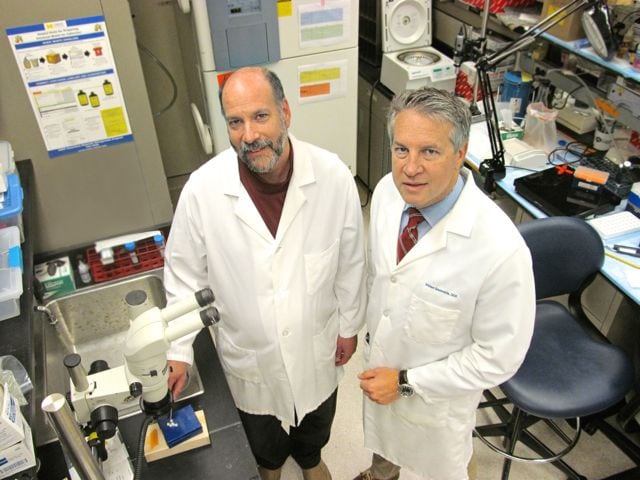
New Michigan Regenerative Medicine Center Formed
The Michigan Regenerative Medicine Resource Center, as it’s official known, will be led by Drs. William Giannobile and David Kohn.

The Michigan Regenerative Medicine Resource Center, as it’s official known, will be led by Drs. William Giannobile and David Kohn.
The University of Michigan School of Dentistry is one of 10 institutions in the country that has been selected by the National Institute of Dental and Craniofacial Research (NIDCR) to establish a center that will develop clinical applications in tissue engineering and regenerative medicine that have dental, oral and craniofacial tests.
The Michigan Regenerative Medicine Resource Center, as it’s official known, will be led by Drs. William Giannobile and David Kohn. Their education and expertise complement each other – Giannobile’s as a clinician/life scientist; Kohn’s as an engineer. Giannobile chairs the school’s Department of Periodontics and Oral Medicine. Kohn is a professor in the school’s Department of Biologic and Materials Sciences and a professor in the Department of Biomedical Engineering at the College of Engineering.
“The center will transform how clinicians in the not-too-distant future repair, reconstruct and regenerate dental, oral and craniofacial anomalies in patients due to injury or disease,” Giannobile says. “In recent years there have been major discoveries and advances in dentistry, medicine, biology, materials science, technology and other fields, and NIDCR wants the Michigan Center and similar centers around the country to find ways to use those advances so clinicians can then apply those discoveries to help their patients.”
Crucial to achieving that objective, Kohn says, will be establishing teams of multidisciplinary and interdisciplinary specialists from across the University of Michigan, industry and private practice. “These teams will be dedicated to selecting the most scientifically sound, clinically and commercially applicable strategies to regenerate oral tissues,” he says.
Historically, Kohn says, discoveries in a laboratory have progressed in a linear fashion, that is, they move forward one step at a time before being commercialized and used clinically. “We want to change that approach,” Kohn adds. “Our teams will take discoveries that show promise and provide the resources to advance the technologies to apply them more quickly than in the past.” This approach, he adds, is uniquely suited to Michigan’s broad scientific, clinical and engineering strengths, and interdisciplinary culture.
Giannobile says clinical teams will work with technical advisory groups and data centers to assess what might be feasible clinically. In the past, he says, scientists and clinicians have not always communicated to take advantages of scientific advances that can be used by dentists in a patient care setting.
Among the groups that will help the Michigan Regenerative Medicine Resource Center will be the Wyss Institute at Harvard, a multidisciplinary research institute that focuses on developing new materials with applications in health care, manufacturing and other areas, and the McGuire Institute in Houston which focuses on delivering clinical applications based on research using new or improved technologies.
The center was established with a $125,000 grant from NIDCR, the first step in what will be a two-step process. The next step involves submitting a proposal that could possibly lead to funding for as much as $10 million, sometime next summer.
– See more at: http://dent.umich.edu/news/2015/10/14/new-michigan-regenerative-medicine-center-formed#sthash.1i4hOOSf.dpuf